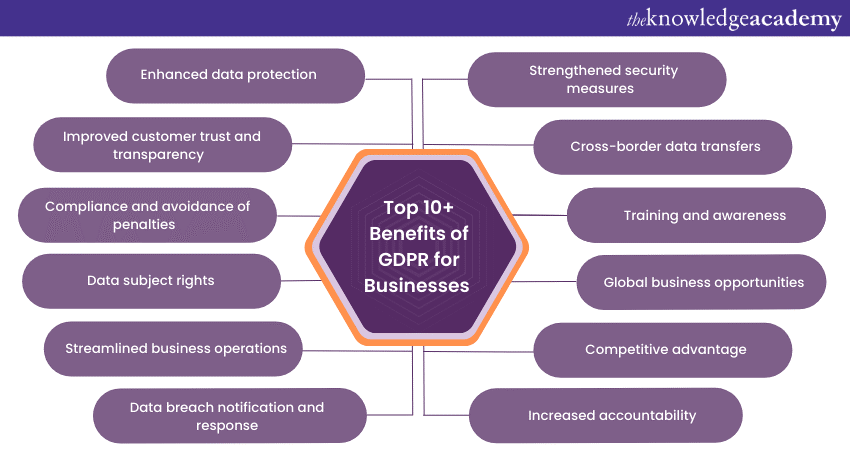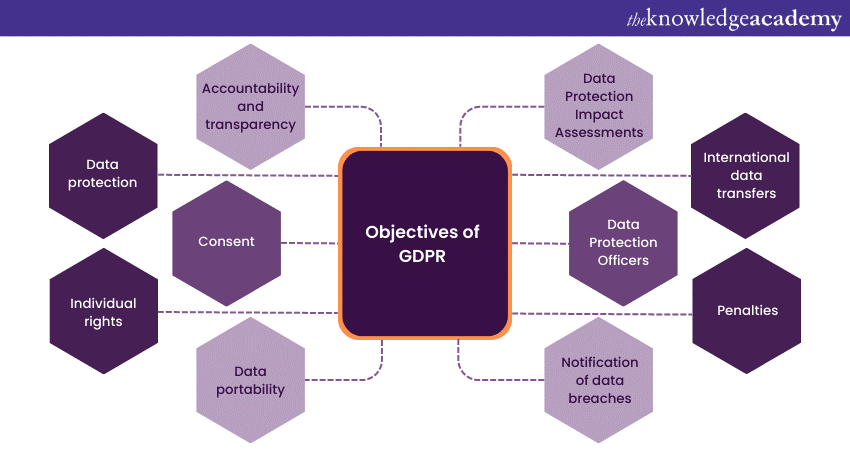We may not have the course you’re looking for. If you enquire or give us a call on 01344203999 and speak to our training experts, we may still be able to help with your training requirements.
Training Outcomes Within Your Budget!
We ensure quality, budget-alignment, and timely delivery by our expert instructors.

With increasing cyber threats and data breaches, businesses seek proactive steps to safeguard their customers’ personal information. This is where the General Data Protection Regulation (GDPR) comes in. One of the primary benefits of this legal framework is the enhanced level of data protection it mandates. By requiring businesses to implement stringent security measures and safeguards, GDPR ensures that personal data is adequately protected from unauthorised access, loss, or theft – a key consideration for any comprehensive GDPR Audit. Several Benefits of GDPR can prove to be a game changer. One of the primary benefits of this legal framework is the enhanced level of data protection it mandates. By requiring businesses to implement stringent security measures and safeguards, The Challenges of GDPR is personal information is sufficiently shielded against theft, loss, and unauthorised access.
According to Legal Jobs, over £7 billion has been spent on GDPR compliance worldwide since its introduction in 2018. Therefore, it is the right time if your organisation hasn’t considered getting GDPR Certified.
Don’t know why is gdpr important? Read this blog to learn about the top Benefits of GDPR. Also, explore how to strengthen your operations and stay ahead in today’s digital landscape.
Table of Contents
1) Various Benefits of GDPR for businesses
a) Enhanced data protection
b) Improved customer trust and transparency
c) Compliance and avoidance of penalties
d) Data subject rights
e) Streamlined business operations
f) Data breach notification and response
g) Strengthened security measures
h) Cross-border data transfers
i) Training and awareness
j) Global business opportunities
k) Competitive advantage
l) Increased accountability
2) Objectives of GDPR
3) Key principles of GDPR
4) GDPR Compliance: Rounding it all up
5) Conclusion
Various benefits of GDPR for businesses
General Data Protection Regulation has become a pivotal regulation in the digital landscape, significantly impacting businesses worldwide. Introduced on May 25, 2018, GDPR aims to protect individuals' private data within the European Union (EU) and provides numerous benefits for businesses. So, let’s explore some of the key business Benefits of GDPR:
Enhanced data protection
Heightened focus on data protection helps businesses maintain the privacy and confidentiality of sensitive information.
Improved customer trust and transparency
Transparency is a key aspect of GDPR. The regulation mandates that businesses be clear and transparent about collecting, storing, and processing personal data. This increased transparency fosters trust between businesses and their customers. When individuals are confident that their data is being handled responsibly, they are likelier to engage with businesses and share their information.

Compliance and avoidance of penalties
Compliance with this framework is not only essential for maintaining customer trust but also for avoiding significant penalties. So, if your organisation isn’t compliant, it can result in hefty fines.
This can further severely affect a business’s reputation and financial stability. By adhering to GDPR, businesses can minimise the risk of penalties and legal consequences, ensuring continued operations.
Data subject rights
GDPR also grants individuals several rights concerning their personal data, including the right to access, rectify, and erase their data. Businesses must establish mechanisms to handle data subject requests and provide timely responses. By respecting these rights, businesses can build trust and demonstrate their commitment to data protection.
Streamlined business operations
While this legal framework imposes certain compliance requirements, it also encourages businesses to adopt more efficient and streamlined data management practices. By implementing GDPR-compliant processes, businesses can ensure that data is collected and processed in a structured and organised manner. This not only helps businesses operate more efficiently but also reduces the risk of data breaches and potential legal consequences.
Data breach notification and response
Under GDPR, businesses are obligated to promptly notify individuals and relevant authorities in case of a data breach. This proactive approach to data breaches helps businesses take appropriate measures to mitigate the impact and protect affected individuals. Therefore, businesses can maintain customer’s trust and loyalty by being transparent about what is a gdpr breach and promptly responding to incidents.
Enhance your understanding of GDPR requirements. Join our EU General Data Protection Regulation (EU GDPR) Awareness Course today!
Strengthened security measures
This legal framework also places significant emphasis on implementing robust security measures to safeguard personal data. Businesses are required to assess and update their security protocols regularly, ensuring data confidentiality, integrity, and availability.
This focus on security helps businesses fortify their defences against cyber threats and potential data breaches. By adhering to GDPR security requirements, businesses can enhance their overall data protection posture.
Cross-border data transfers
GDPR introduces stringent requirements for transferring personal data outside the EU. Businesses must ensure that appropriate safeguards are in place. They should consider these requirements when transferring data to countries with less stringent data protection laws. By adhering to GDPR Requirements, businesses can maintain the integrity and security of personal data during cross-border transfers.
Training and awareness
The framework necessitates training and awareness programs to ensure employees understand their responsibilities regarding data protection. Therefore, businesses can foster a data protection culture by educating employees on GDPR principles and best practices. They can also ensure that everyone contributes to maintaining compliance.
Enhance your knowledge of data protection; register for our GDPR Training now!
Global business opportunities
GDPR is not limited to businesses within the EU. Even organisations operating outside the EU can benefit from this framework by aligning their data protection practices with its standards. By demonstrating a commitment to data privacy and protection, businesses can expand their customer base and explore new opportunities in the global market. Further, its compliance can enhance a company’s reputation as a trustworthy and responsible entity, attracting international customers and fostering international business relationships.
Competitive advantage
Compliance with this framework can provide a competitive advantage for businesses. By demonstrating a commitment to protecting customer data and privacy, businesses can differentiate themselves from competitors. Customers are likelier to choose businesses that prioritise data security and privacy, leading to increased customer loyalty and trust.
Increased accountability
GDPR also promotes accountability in data protection practices. Businesses are required to document and maintain records of their data processing activities. This includes information about the legal basis for processing, data retention periods, and measures taken to ensure data security.
By promoting accountability, it encourages businesses to adopt responsible data-handling practices and maintain compliance with regulatory requirements.

Objectives of GDPR
The objectives of the General Data Protection Regulation (GDPR) are:
a) Data protection: To standardise and strengthen data protection laws in the EU for secure and lawful personal data processing.
b) Individual rights: To empower individuals with greater control over their data, including the right to access, correct, and delete their information.
c) Accountability and transparency: To assess obligations on organisations to be transparent about data processing actions and accountable for data breaches.
d) Consent: To establish precise requirements for obtaining and managing individuals' consent for data processing.
e) Data portability: To allow individuals to quickly move their data from one service provider to another.
f) Data Protection Impact Assessments (DPIAs): Organisations should be mandated to evaluate and address potential risks linked to their data processing activities.
g) Data Protection Officers (DPOs): It is recommended to appoint data protection officers to ensure compliance with organisation data protection regulations.
h) Notification of data breaches: To require timely reporting of data breaches to authorities and affected individuals.
i) International data transfers: To ensure adequate protection, regulate the transfer of personal data outside the EU and EEA.
j) Penalties: Significant fines should be imposed to encourage organisations to take data protection seriously for non-compliance.

Key principles of GDPR
The following are the key principles of GDPR:
a) Lawfulness, fairness, and transparency: Processing confidential data must be done fairly, lawfully, and transparently. Individuals must be informed of how their data is used.
b) Purpose limitation: Personal data must only be collected for lawful purposes.
c) Data minimisation: Personal data should be limited to what is necessary for the stated goal.
d) Accuracy: Ensuring that confidential data is correct and up-to-date is crucial. Whenever necessary, the data should be corrected or deleted without delay.
e) Storage limitation: Personal data should only be kept for as long as necessary to achieve the intended purpose.
f) Integrity and confidentiality: It is crucial to ensure that personal data is processed securely, guarding against unauthorised access, disclosure, or destruction. It is essential to take necessary measures to protect personal data from potential risks that may compromise its confidentiality, integrity or availability.
g) Accountability: Organisations must acknowledge their data processing activities and showcase their adherence to the GDPR.
GDPR Compliance: Rounding it all up
Here are five key areas that summarise the Benefits of GDPR compliance:
Ensuring legal compliance is crucial to avoid fines and penalties and meet all regulatory obligations within the GDPR Scope.
Improving your reputation can be achieved by enhancing your commitment to data privacy, which can help build trust and loyalty with your customers.
Enhance operational efficiency by simplifying data management processes and improving data quality and accuracy.
GDPR risk assessment is critical for ensuring the security and privacy of sensitive information. Taking necessary measures to mitigate risks and prevent potential data breaches is essential.
A competitive advantage can help your business stand out in the marketplace and attract privacy-conscious customers.
Conclusion
Businesses can enjoy several Benefits of GDPR by getting compliant. By embracing and prioritising data protection, businesses can establish themselves as responsible and trustworthy entities in the modern digital environment.
Take the first step towards GDPR compliance. Join our Certified EU General Data Protection Regulation (EU GDPR) Foundation And Practitioner Course now!
Frequently Asked Questions
Upcoming IT Security & Data Protection Resources Batches & Dates
Date
 Certified EU General Data Protection Regulation (EU GDPR) Foundation and Practitioner
Certified EU General Data Protection Regulation (EU GDPR) Foundation and Practitioner
Sat 14th Sep 2024, Sun 15th Sep 2024
Mon 23rd Sep 2024
Mon 18th Nov 2024
Sat 7th Dec 2024, Sun 8th Dec 2024
Mon 13th Jan 2025
Mon 3rd Mar 2025
Mon 14th Apr 2025
Tue 27th May 2025
Mon 14th Jul 2025
Tue 26th Aug 2025







 Top Rated Course
Top Rated Course


 If you wish to make any changes to your course, please
If you wish to make any changes to your course, please


